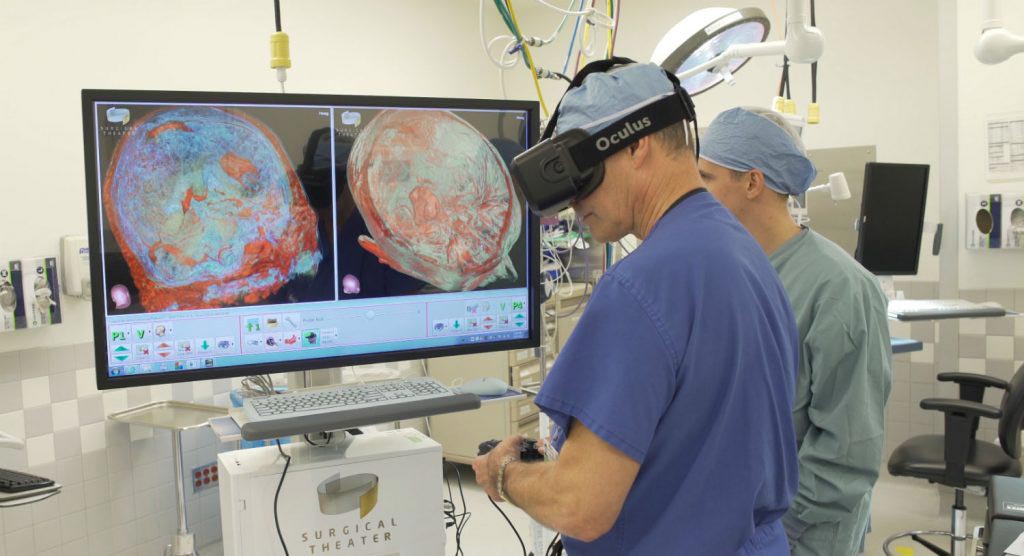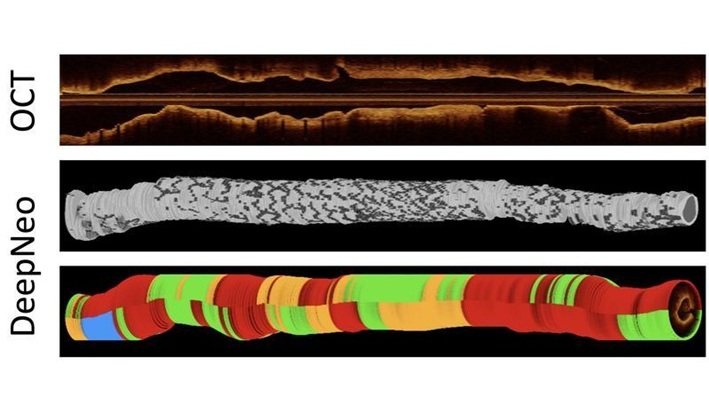Virtual Reality Platform Helps Create Surgical Plans
|
By HospiMedica International staff writers Posted on 23 Apr 2019 |

Image: A VR system assists neurosurgeons plan surgery (Photo courtesy of Surgical Theater).
An innovative 360-degree virtual reality (VR) technology allows surgeons to walk inside their patients' anatomy and create a surgical plan.
The Surgical Theater (Mayfield Village, OH, USA) Precision VR medical visualization platform is designed to work on multiple levels of interaction with the aid of the Oculus Rift or HTC Vive VR headsets. The VR models are constructed and rendered based upon CT and MRI scans, culminating in a patient-specific 360° virtual tour which can be used to create an intuitive, immersive approach to patient engagement, surgical planning, resident in training education, and multidisciplinary collaboration.
Neurosurgeons can navigate their patients’ anatomy and simulate complex operations before making an incision and residents can hone their surgical techniques and situational awareness of the patient’s brain anatomy, optimizing performance and skill before entering the operating room. Other applications include spine, ENT, thoracic, cardiac, and gastrointestinal applications. An Enterprise solution enables hospitals to achieve deployment on a system-wide scale, including satellite locations, while complying with security policies, with all 360° VR cases stored in the hospital's data center.
“Our Precision VR Enterprise Solution is providing 360-degree images that allow patients and surgeons to walk inside the CT and MRI, which has been proven to provide better communication of medical information between surgeons and patients and surgeons and their peers,” said Moty Avisar, CEO and co-founder of Surgical Theater. “This ‘walk-in’ experience is now available on a system-wide-scale, enhancing efficiency in the consultation and surgical planning workflow for multiple specialties.”
“The scalability of the Enterprise Solution integrates seamlessly into a hospital's existing workflow, enabling VR to be accessible anywhere, anytime,” said Chris Gough, general manager of Health & Life Sciences at Intel Corporation. “Intel and Surgical Theater have a strong partnership for bringing virtual and augmented reality solutions to healthcare, and we are delighted that the Enterprise Solution is now available for the European market.”
VR technology provides an immersive, multisensory, and 3D environment that enables users to have modified experiences of reality by stimulating the visual, auditory, and proprioception senses. VR has already been used to help treat anxiety disorders, support physical rehabilitation, and distract patients during wound care.
Related Links:
Surgical Theater
The Surgical Theater (Mayfield Village, OH, USA) Precision VR medical visualization platform is designed to work on multiple levels of interaction with the aid of the Oculus Rift or HTC Vive VR headsets. The VR models are constructed and rendered based upon CT and MRI scans, culminating in a patient-specific 360° virtual tour which can be used to create an intuitive, immersive approach to patient engagement, surgical planning, resident in training education, and multidisciplinary collaboration.
Neurosurgeons can navigate their patients’ anatomy and simulate complex operations before making an incision and residents can hone their surgical techniques and situational awareness of the patient’s brain anatomy, optimizing performance and skill before entering the operating room. Other applications include spine, ENT, thoracic, cardiac, and gastrointestinal applications. An Enterprise solution enables hospitals to achieve deployment on a system-wide scale, including satellite locations, while complying with security policies, with all 360° VR cases stored in the hospital's data center.
“Our Precision VR Enterprise Solution is providing 360-degree images that allow patients and surgeons to walk inside the CT and MRI, which has been proven to provide better communication of medical information between surgeons and patients and surgeons and their peers,” said Moty Avisar, CEO and co-founder of Surgical Theater. “This ‘walk-in’ experience is now available on a system-wide-scale, enhancing efficiency in the consultation and surgical planning workflow for multiple specialties.”
“The scalability of the Enterprise Solution integrates seamlessly into a hospital's existing workflow, enabling VR to be accessible anywhere, anytime,” said Chris Gough, general manager of Health & Life Sciences at Intel Corporation. “Intel and Surgical Theater have a strong partnership for bringing virtual and augmented reality solutions to healthcare, and we are delighted that the Enterprise Solution is now available for the European market.”
VR technology provides an immersive, multisensory, and 3D environment that enables users to have modified experiences of reality by stimulating the visual, auditory, and proprioception senses. VR has already been used to help treat anxiety disorders, support physical rehabilitation, and distract patients during wound care.
Related Links:
Surgical Theater
Latest Surgical Techniques News
- DNA Origami Improves Imaging of Dense Pancreatic Tissue for Cancer Detection and Treatment
- Pioneering Sutureless Coronary Bypass Technology to Eliminate Open-Chest Procedures
- Intravascular Imaging for Guiding Stent Implantation Ensures Safer Stenting Procedures
- World's First AI Surgical Guidance Platform Allows Surgeons to Measure Success in Real-Time
- AI-Generated Synthetic Scarred Hearts Aid Atrial Fibrillation Treatment
- New Class of Bioadhesives to Connect Human Tissues to Long-Term Medical Implants
- New Transcatheter Valve Found Safe and Effective for Treating Aortic Regurgitation
- Minimally Invasive Valve Repair Reduces Hospitalizations in Severe Tricuspid Regurgitation Patients
- Tiny Robotic Tools Powered by Magnetic Fields to Enable Minimally Invasive Brain Surgery
- Magnetic Tweezers Make Robotic Surgery Safer and More Precise
- AI-Powered Surgical Planning Tool Improves Pre-Op Planning
- Novel Sensing System Restores Missing Sense of Touch in Minimally Invasive Surgery
- Headset-Based AR Navigation System Improves EVD Placement
- Higher Electrode Density Improves Epilepsy Surgery by Pinpointing Where Seizures Begin
- Open-Source Tool Optimizes Placement of Visual Brain Implants
- Easy-To-Apply Gel Could Prevent Formation of Post-Surgical Abdominal Adhesions
Channels
Critical Care
view channel
AI Model Analyzes Patient Data to Diagnose Multiple Sclerosis With 90% Accuracy
Multiple sclerosis (MS) is a chronic inflammatory condition affecting the central nervous system. Most patients initially experience the relapsing-remitting form (RRMS), characterized by periods of symptom... Read more
Magnetically Navigable Microparticles Enable Targeted Drug Delivery
Abdominal aortic aneurysms (AAA) can be life-threatening if not treated and result in nearly 10,000 deaths annually. Researchers working to improve treatments for AAA could now make it possible for doctors... Read more
AI-Powered Algorithm Automates Analysis of Coronary Stents After Implantation
Every year, over three million people globally receive stents to open blocked blood vessels caused by heart disease. However, monitoring the healing process after stent implantation remains a significant challenge.... Read morePatient Care
view channel
Portable Biosensor Platform to Reduce Hospital-Acquired Infections
Approximately 4 million patients in the European Union acquire healthcare-associated infections (HAIs) or nosocomial infections each year, with around 37,000 deaths directly resulting from these infections,... Read moreFirst-Of-Its-Kind Portable Germicidal Light Technology Disinfects High-Touch Clinical Surfaces in Seconds
Reducing healthcare-acquired infections (HAIs) remains a pressing issue within global healthcare systems. In the United States alone, 1.7 million patients contract HAIs annually, leading to approximately... Read more
Surgical Capacity Optimization Solution Helps Hospitals Boost OR Utilization
An innovative solution has the capability to transform surgical capacity utilization by targeting the root cause of surgical block time inefficiencies. Fujitsu Limited’s (Tokyo, Japan) Surgical Capacity... Read more
Game-Changing Innovation in Surgical Instrument Sterilization Significantly Improves OR Throughput
A groundbreaking innovation enables hospitals to significantly improve instrument processing time and throughput in operating rooms (ORs) and sterile processing departments. Turbett Surgical, Inc.... Read moreHealth IT
view channel
Printable Molecule-Selective Nanoparticles Enable Mass Production of Wearable Biosensors
The future of medicine is likely to focus on the personalization of healthcare—understanding exactly what an individual requires and delivering the appropriate combination of nutrients, metabolites, and... Read more
Smartwatches Could Detect Congestive Heart Failure
Diagnosing congestive heart failure (CHF) typically requires expensive and time-consuming imaging techniques like echocardiography, also known as cardiac ultrasound. Previously, detecting CHF by analyzing... Read moreBusiness
view channel
Expanded Collaboration to Transform OR Technology Through AI and Automation
The expansion of an existing collaboration between three leading companies aims to develop artificial intelligence (AI)-driven solutions for smart operating rooms with sophisticated monitoring and automation.... Read more
















